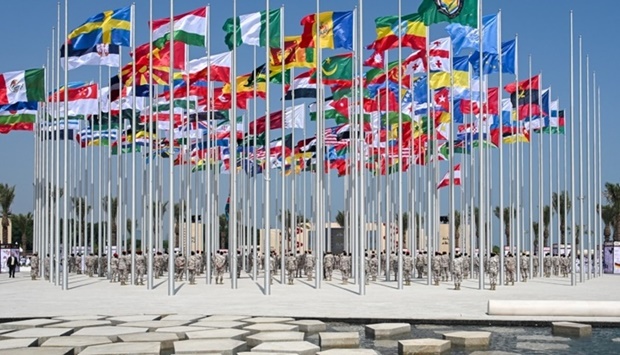The Middle East's first ever football World Cup, hosted by Qatar, is seen benefiting the wider Gulf Co-operation Council (GCC) economy, according to Oxford Economics, a leader in global economic forecasting and econometric analysis.
Given the recovery in travel and tourism, it forecasts 4.9% and 3.4% growth in the region's non-oil sector in 2022 and 2023, respectively, it said in a report.
Oxford Economics expects Qatar to gain the most; the preparations for the World Cup and the month-long event itself will drive 7.6% growth in the non-oil economy this year, the fastest pace since 2015.
Highlighting that the World Cup has played a pivotal part in Qatar's journey to diversify its economy away from the energy sector; it said by the end of this year, the share of the non-oil sectors in GDP (gross domestic product) looks poised to reach close to 63%, up from 50% a decade ago.
Diversification has been achieved through strong gains in construction and real estate (via residential and leisure facilities), transportation (via upgraded transport links, including a new airport and Doha Metro) and financial services, with the share of the energy sector holding relatively constant.
Given high share of long-haul source markets, the travel and tourism sector will spur this rebound, it said, adding the tournament, which starts on November 20, is set to attract more than 1mn visitors to Qatar, which its estimates show will lift the 2022 total to 2.8mn, surpassing 2019 levels.
"The World Cup is strengthening momentum in travel and tourism in Qatar and across the GCC region this year, shrugging off the impact of strong dollar-pegged currencies and underpinning non-oil recovery," Oxford Economics said.
Longer term, the infrastructure upgrade linked to the World Cup has the potential to be FDI (foreign direct investment) "positive" for Qatar, helping fulfil some of the diversification goals charted in its National Vision 2030.
"The modern infrastructure coupled with reforms has the potential to reinvigorate FDI inflows after a recent period of divestment," it said, adding "in Qatar's case, the improved relations with neighbours will be a key driver of the rise in inward FDI we project for this year and beyond."
Qatar's strong finances will support its efforts to broaden the economy, but ongoing reform will be equally important given rising competition in the region, the report said.
"We think further reforms will also play a role as Qatar keeps up with growing competition in the region," it said, adding the ongoing reforms will be equally essential to achieving goals charted in Qatar's broad development strategy – the National Vision 2030 – as the World Cup itself.
Given the recovery in travel and tourism, it forecasts 4.9% and 3.4% growth in the region's non-oil sector in 2022 and 2023, respectively, it said in a report.
Oxford Economics expects Qatar to gain the most; the preparations for the World Cup and the month-long event itself will drive 7.6% growth in the non-oil economy this year, the fastest pace since 2015.
Highlighting that the World Cup has played a pivotal part in Qatar's journey to diversify its economy away from the energy sector; it said by the end of this year, the share of the non-oil sectors in GDP (gross domestic product) looks poised to reach close to 63%, up from 50% a decade ago.
Diversification has been achieved through strong gains in construction and real estate (via residential and leisure facilities), transportation (via upgraded transport links, including a new airport and Doha Metro) and financial services, with the share of the energy sector holding relatively constant.
Given high share of long-haul source markets, the travel and tourism sector will spur this rebound, it said, adding the tournament, which starts on November 20, is set to attract more than 1mn visitors to Qatar, which its estimates show will lift the 2022 total to 2.8mn, surpassing 2019 levels.
"The World Cup is strengthening momentum in travel and tourism in Qatar and across the GCC region this year, shrugging off the impact of strong dollar-pegged currencies and underpinning non-oil recovery," Oxford Economics said.
Longer term, the infrastructure upgrade linked to the World Cup has the potential to be FDI (foreign direct investment) "positive" for Qatar, helping fulfil some of the diversification goals charted in its National Vision 2030.
"The modern infrastructure coupled with reforms has the potential to reinvigorate FDI inflows after a recent period of divestment," it said, adding "in Qatar's case, the improved relations with neighbours will be a key driver of the rise in inward FDI we project for this year and beyond."
Qatar's strong finances will support its efforts to broaden the economy, but ongoing reform will be equally important given rising competition in the region, the report said.
"We think further reforms will also play a role as Qatar keeps up with growing competition in the region," it said, adding the ongoing reforms will be equally essential to achieving goals charted in Qatar's broad development strategy – the National Vision 2030 – as the World Cup itself.


